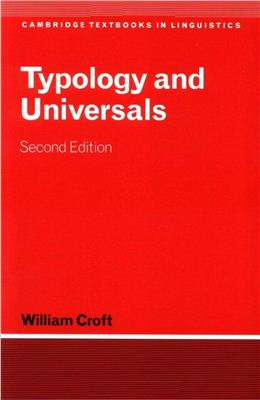Cambridge University Press, 2002 - Language Arts & Disciplines -
341 p.
Comparison of the grammars of human languages reveals systematic pattes of variation. Typology and universals research uncovers those pattes to formulate universal constraints on language and seek their exploration. In this essential textbook, William Croft presents a comprehensive introduction to the method and theory used in studying typology and universals. The theoretical issues discussed range from the most fundamental to the most abstract. The book provides students and researchers with extensive examples of language universals in phonology, morphology, syntax and semantics. This second edition has been thoroughly rewritten and updated to reflect advances in typology and universals in the past decade, including: new methodologies such as the semantic map model and questions of syntactic argumentation; discussion of current debates over deeper explanations for specific classes of universals; and comparison of the typological and generative approaches to language.
Comparison of the grammars of human languages reveals systematic pattes of variation. Typology and universals research uncovers those pattes to formulate universal constraints on language and seek their exploration. In this essential textbook, William Croft presents a comprehensive introduction to the method and theory used in studying typology and universals. The theoretical issues discussed range from the most fundamental to the most abstract. The book provides students and researchers with extensive examples of language universals in phonology, morphology, syntax and semantics. This second edition has been thoroughly rewritten and updated to reflect advances in typology and universals in the past decade, including: new methodologies such as the semantic map model and questions of syntactic argumentation; discussion of current debates over deeper explanations for specific classes of universals; and comparison of the typological and generative approaches to language.

